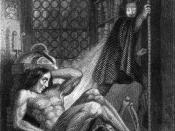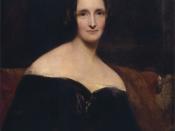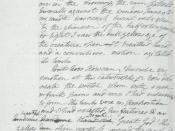Frankenstein by Mary Shelley is both a critique and an admiration of Romantic beliefs and ideologies. Examples of Romantic Ideologies are present throughout most of the novel, along with both the truthfulness and admiration in such ideals, and the detrimental effects that these ideals impose on society. Mary Shelley uses the story of Frankenstein as a warning of such Romantic Ideals by demonstrating the negative outcomes that have been caused by these ideals. She uses the Romantic idea of an Idyllic childhood, which is represented through the character of Victor Frankenstein and transforms this idea into a warning by making Victor grow into the man who ultimately causes the death of his loved ones. She also uses the Romantic idea of the desire to elevate human beings into living Gods, and the strong belief in fatalism, in which Victor possesses, and incorporates these desires/beliefs into the causes of the detriment caused by Victor's actions.
However she uses the idea of the 'noble savage' represented by the character of Frankenstein's creature in admiration and in a sense or truthfulness. Frankenstein is both an admiration and critique of Romantic Ideology in that it both agrees and disagrees with certain Romantic ideals.
Firstly, it is expected that Victor, with his Idyllic childhood, should grow up to be a great man of kindness and good values. However Victor ends up being the cause of the deaths of his loved ones. The Romantic idea that a man with a good childhood should grow up to be a man of nobility and generosity is contradicted and criticised by Shelley's character of Victor, who develops into a man of selfish motivations and senseless actions. When Victor was young, he had the perfect childhood. He had parents that loved him dearly, and nurtured him with great affection, along...


